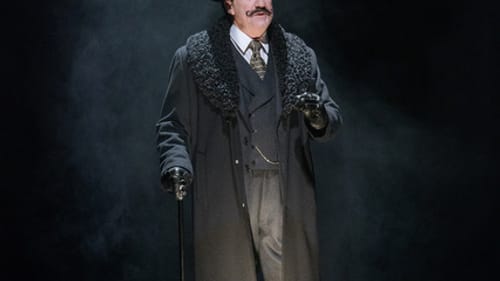Stay in the Loop
BSR publishes on a weekly schedule, with an email newsletter every Wednesday and Thursday morning. There’s no paywall, and subscribing is always free.
Keeping Agatha Christie on track
The Resident Ensemble Players present Ken Ludwig’s ‘Murder on the Orient Express’

In a theatrical world rife with dysfunctional families, dementia, and cross-dressing, the current splendid production of Murder on the Orient Express from Delaware’s Resident Ensemble Players (directed with élan by Sanford Robbins) offers a dazzling, satisfying evening of suspense, train travel, and murder.
As this production opens, the requisite pre-show announcement is ostensibly by Miss Marple, who informs us (tartly) that the show will feature “Miss Christie’s other detective.” And then in a whoosh of steam and vintage-movie titles, a child is kidnapped and killed, and onto the stage strolls black-suited, bowler-hatted Hercule Poirot (Lee E. Ernst in a pitch-perfect performance).
Poirot promises “a pleasant evening together reliving the greatest case of my career,” and this show delivers in playwright Ken Ludwig’s snappy-yet-respectful adaptation of Agatha Christie’s classic tale.
All aboard
In a posh Istanbul hotel, first-class passengers await their boarding call for the fabled Orient Express to Paris. Poirot, a last-minute addition to the group, is squeezed onto the train by unflappable conductor Michel (René Thornton, Jr.) at the urging of Monsieur Bouc (Stephen Pelinski), the detective’s old friend and director of the train company.
On board are stiff-upper-lip Scottish Colonel Arbuthnot (Mic Matarrese); lovely governess Mary Debenham (Jacqueline Correa); imperious Russian Princess Dragomiroff (Elizabeth Heflin) with her overly religious companion Greta Ohlsson (Jenny Bennett); and the beautiful Countess Andrenyi (Robyn Cohen). Americans joining the European cadre include brash millionairess Helen Hubbard (Kathleen Pirkl Tague); wheeler-dealer Samuel Ratchett (Hassan El-Amin); and his anxiety-ridden private secretary Hector MacQueen (Michael Gotch).
After the train leaves the station, there is a middle-of-the-night blizzard and a murder. No spoiler—it’s in the title. With the train stalled by snow, Monsieur Bouc (fearing for his company’s reputation) begs Poirot to solve the case before police arrive. And of course, he does.
This could be a novel…
Surveying the assembled company, Poirot quips, “If I were Balzac, I would write a novel about them!” Sideways references like this are inserted with respect and skill in an adaptation both smooth and masterful. The playwright dropped four major characters, and he adeptly inserts clever or comic lines to contemporize the action.
Many of Ludwig’s 26 award-winning plays are high-action comedies like Lend Me A Tenor or Baskerville (recently at Delaware Theatre Company). But this is a true melodrama hewing very close to the novel. It’s telling that the Christie estate, so stringently managed by her great-grandson James Pritchard, tapped Ludwig to adapt her most successful and well-known property.
Ludwig created a true ensemble work: with the exception of Poirot, all roles are afforded equal weight and stage time, a balance that Robbins and his cast perfectly achieve. They smoothly sustain the heightened intensity required to push forward the melodramatic pace without flagging or resorting to thespian grandstanding.

Real and cunning
The delicious character of Poirot, much interpreted, can grow tedious with over-embellishment and references to his florid “moustaches.” But Ernst portrays the “famous Belgian detective” with welcome simplicity, his idiosyncrasies arising from character rather than embroidered artifice. His Poirot pontificates less and searches more, working diligently through a puzzle frustrating to a man accustomed to smoother success. And at the play’s end, standing in a white spotlight, Ernst embodies the waiting-for-Godot loneliness of the truth-seeker.
With a cadre of designers familiar with REP and working at top form, the physical production is thrilling. Inside a trio of fretted arches framing the stage with changing colors, scenic designer Linda Buchanan created a magnificent evocation of 1930s luxury, including a train that is both gloriously real and a cunning piece of stagecraft.
The set is lusciously lit by Mary Louise Geiger, and every perfectly dressed character is dripping with sartorial authenticity in Fabio Toblini’s opulent costumes. Clint Allen’s projections and videos consistently enhance the action while never overshadowing it, and Lindsay Jones created original music and an aural design that wraps you in the sounds and sensations of travel.
What is justice?
Underlying this busy tale is Christie’s exploration of a great question: What constitutes justice? In the midst of myriad clues and red herrings, gorgeous staging, and the sheer beauty of this production, it would be easy to lose sight of the query that actually drives the action. It’s a tribute to Robbins’s pulsing direction that this does not happen. He carefully husbands the tale’s philosophical nugget throughout the evening, and it surfaces tellingly as the evening goes forward.
The big reveal at the end—every Poirot tale concludes with one—will be just as satisfying whether you know the story or whether it’s new to you. Christie’s long-acknowledged mystery mastery and Ludwig’s oft-performed adaptation are in good hands. Robbins’s splendid production has already been extended, and with good cause. It’s a stunner.
What, When, Where
Murder on the Orient Express, adapted by Ken Ludwig and directed by Sanford Robbins. Through December 8, 2019 at the Thompson Theatre of the University of Delaware’s Roselle Center for the Arts, 110 Orchard Road, Newark, Delaware. (302) 831-2204 or rep.udel.edu.
The Thompson Theatre in the Roselle Center is a wheelchair-accessible venue. To learn more or request accommodations, call the box office or email [email protected] at least five days in advance of the performances.
Sign up for our newsletter
All of the week's new articles, all in one place. Sign up for the free weekly BSR newsletters, and don't miss a conversation.
 Gail Obenreder
Gail Obenreder